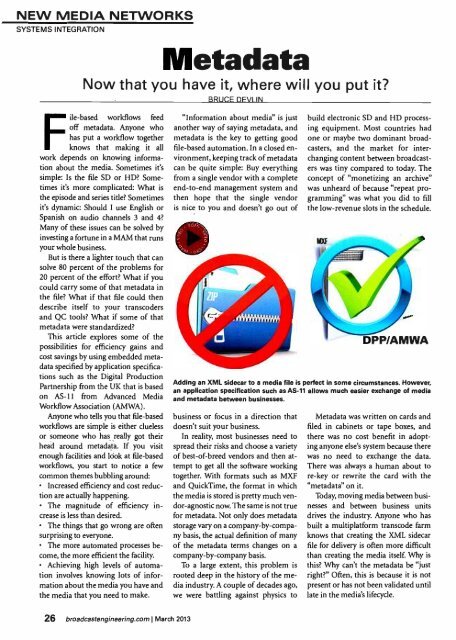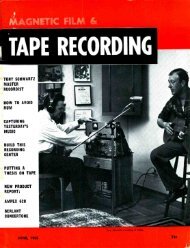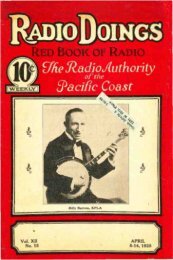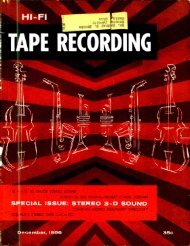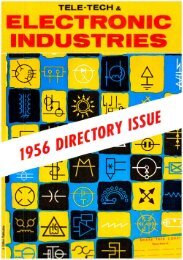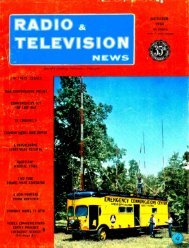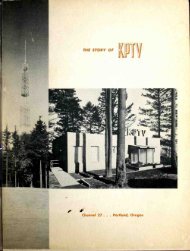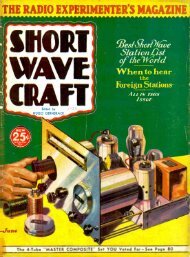ßroadcastEnsineerin - AmericanRadioHistory.Com
ßroadcastEnsineerin - AmericanRadioHistory.Com
ßroadcastEnsineerin - AmericanRadioHistory.Com
You also want an ePaper? Increase the reach of your titles
YUMPU automatically turns print PDFs into web optimized ePapers that Google loves.
NEW MEDIA NETWORKS<br />
SYSTEMS INTEGRATION<br />
Metadata<br />
Now that you have it, where will you put it?<br />
BRUCE DFVI IN<br />
File -based workflows feed<br />
off metadata. Anyone who<br />
has put a workflow together<br />
knows that making it all<br />
work depends on knowing information<br />
about the media. Sometimes it's<br />
simple: Is the file SD or HD? Sometimes<br />
it's more complicated: What is<br />
the episode and series title? Sometimes<br />
it's dynamic: Should I use English or<br />
Spanish on audio channels 3 and 4?<br />
Many of these issues can be solved by<br />
investing a fortune in a MAM that runs<br />
your whole business.<br />
But is there a lighter touch that can<br />
solve 80 percent of the problems for<br />
20 percent of the effort? What if you<br />
could carry some of that metadata in<br />
the file? What if that file could then<br />
describe itself to your transcoders<br />
and QC tools? What if some of that<br />
metadata were standardized?<br />
This article explores some of the<br />
possibilities for efficiency gains and<br />
cost savings by using embedded metadata<br />
specified by application specifications<br />
such as the Digital Production<br />
Partnership from the UK that is based<br />
on AS -11 from Advanced Media<br />
Workflow Association (AMWA).<br />
Anyone who tells you that file -based<br />
workflows are simple is either clueless<br />
or someone who has really got their<br />
head around metadata. If you visit<br />
enough facilities and look at file -based<br />
workflows, you start to notice a few<br />
common themes bubbling around:<br />
Increased efficiency and cost reduction<br />
are actually happening.<br />
The magnitude of efficiency increase<br />
is less than desired.<br />
The things that go wrong are often<br />
surprising to everyone.<br />
The more automated processes become,<br />
the more efficient the facility.<br />
Achieving high levels of automation<br />
involves knowing lots of information<br />
about the media you have and<br />
the media that you need to make.<br />
"Information about media" is just<br />
another way of saying metadata, and<br />
metadata is the key to getting good<br />
file -based automation. In a closed environment,<br />
keeping track of metadata<br />
can be quite simple: Buy everything<br />
from a single vendor with a complete<br />
end -to -end management system and<br />
then hope that the single vendor<br />
is nice to you and doesn't go out of<br />
build electronic SD and HD processing<br />
equipment. Most countries had<br />
one or maybe two dominant broadcasters,<br />
and the market for interchanging<br />
content between broadcasters<br />
was tiny compared to today. The<br />
concept of "monetizing an archive"<br />
was unheard of because "repeat programming"<br />
was what you did to fill<br />
the low- revenue slots in the schedule.<br />
DPP /AMWA<br />
Adding an XML sidecar to a media file is perfect in some circumstances. However,<br />
an application specification such as AS -11 allows much easier exchange of media<br />
and metadata between businesses.<br />
business or focus in a direction that<br />
doesn't suit your business.<br />
In reality, most businesses need to<br />
spread their risks and choose a variety<br />
of best -of -breed vendors and then attempt<br />
to get all the software working<br />
together. With formats such as MXF<br />
and QuickTime, the format in which<br />
the media is stored is pretty much vendor-<br />
agnostic now. The same is not true<br />
for metadata. Not only does metadata<br />
storage vary on a company-by- company<br />
basis, the actual definition of many<br />
of the metadata terms changes on a<br />
company -by- company basis.<br />
To a large extent, this problem is<br />
rooted deep in the history of the media<br />
industry. A couple of decades ago,<br />
we were battling against physics to<br />
Metadata was written on cards and<br />
filed in cabinets or tape boxes, and<br />
there was no cost benefit in adopting<br />
anyone else's system because there<br />
was no need to exchange the data.<br />
There was always a human about to<br />
re -key or rewrite the card with the<br />
"metadata" on it.<br />
Today, moving media between businesses<br />
and between business units<br />
drives the industry. Anyone who has<br />
built a multiplatform transcode farm<br />
knows that creating the XML sidecar<br />
file for delivery is often more difficult<br />
than creating the media itself. Why is<br />
this? Why can't the metadata be "just<br />
right ?" Often, this is because it is not<br />
present or has not been validated until<br />
late in the media's lifecycle.<br />
26 broadcastengineering.com I March 2013


